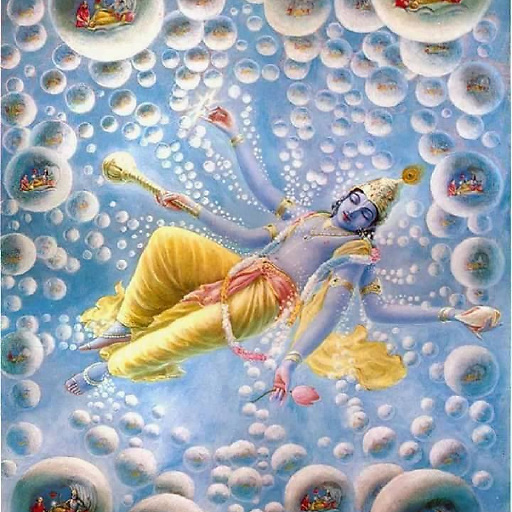CHAPTER IX
(THE WORK OF DISSOLUTION DESCRIBED)
Vaishampāyana said:—Having assumed the form of fire the Yogin Nārāyana, of seven forms, dries up the oceans with burning flames. By His own energy He destroys all desires in the shape of rivers and oceans and their powers in the form of mountains. He also destroys the two bodies gross and subtle. And fixing all on Brahma, the root of both the bodies He dries up all the qualities in order to create the universe again. He gives unto creatures the felicity that lies in Brahma the efficient cause of the universe. At that time He destroys even all this. Although Hari is powerful like the wind, He, having conquered the whole universe, draws upwards the five vital breaths and the five senses.
Afterwards the five senses of the celestials and other creatures and their objects, such as smell, body etc. resort to the earth (for their existence) (1-6). The organ of taste, tongue and its object juice go to the water. The organ of vision eye and its object colour go to the luminous bodies. The organ of touch, skin, and its object touch, the vital breath and its work, motion, go to the air. And all these exist in the Hrishikesha who is like a thread (7-8). In order to keep the gods, pervaded by subtle faculties, senses and their objects in a balanced state in the universal thread the Omniscient Lord attracts them all through the air. Then the dreadful fire Samvarttaka, the cause of the universe produced by the contact of colour, touch &c, burning up in a hundred flames, consumes the whole world. After that fire has reduced, into ashes, the mountains, trees, groves, creepers, twigs, celestial cars, cities, hermitages, celestial buildings and other habitations, Hari, the preceptor of the world, extinguishes it with the water of action. Then assuming the form of a huge cloud the thousand-eyed, highly powerful Krishna gratifies the earth with pure water.
Thereupon when the earth is greatly pacified with highly auspicious, sacred, sweet and nectar-like water, when the mountains and trees lie under water, when the clouds are surcharged with water, when the earth is converted into one sheet of water and shorn of all creatures, all the great elements are immersed in Hrishikesha, lying in a subtle place shorn of the sun, ether and living creatures (9-17). Thus having dried up, consumed, agitated and drunk the entire creation the Eternal Purusha, of unlimited intellect, exists alone resorting to His ancient form. When the great Yogin lies in his Yoga sleep in the all-covering ocean, all the elements, existing eternally, lie unitedly in the pure Brahma. No one can perceive that unmanifest Purusha as manifest when He lies for ayuta thousand years in the one ocean (18–19).
Janamejaya said:—What is this all-expanding ocean which thou hast described? Who is this Purusha? What is Yoga? who is a Yogin? (20).
Vaishampāyana said:—No one can understand waiting how long the Lord will convert all into one ocean. At that time the Lord will only gauge all, see all and know all: nothing else will be perceptible. Having permeated the the sky, earth, air and the other elements with His intelligence and kept the lord of celestials, Brahmā endued with mental faculties immersed in Himself the Lord, controlling His creative energy, will be asleep in the water (21–22).
Source: https://archive.org/details/AProseEnglishTranslationOfHarivamsh
| Previous | | Source | | Tamil Translation | | Next |
